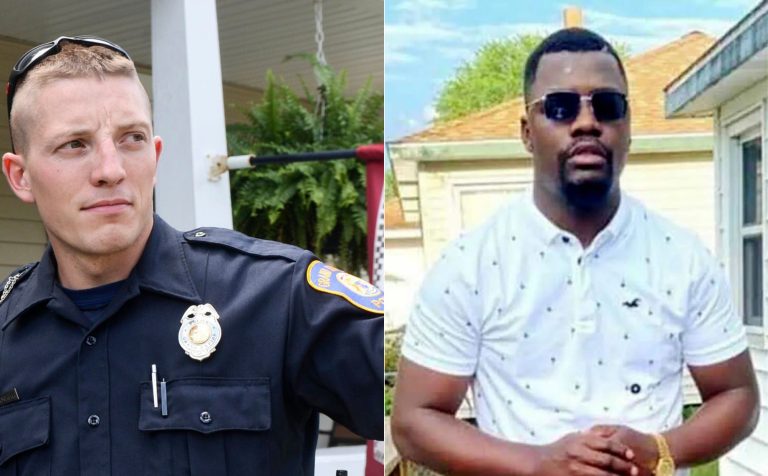A prosecutor charged a Michigan police officer with second-degree murder on Thursday for the death of Patrick Lyoya, a Black man who was on the ground when he was shot in the back of the head following a traffic stop captured on a bystander’s phone.
Prosecutor Chris Becker of Kent County announced his decision against Grand Rapids Officer Christopher Schurr, who killed Patrick Lyoya minutes after a traffic stop on April 4. The final terrifying moments were captured on video by a passenger in the car.
While Lyoya was on the ground, Schurr fired the fatal shot, demanding that the 26-year-old Congolese refugee “let go” of the officer’s Taser. “The death was not justified or excused, for example, by self-defense,” said the prosecutor, reciting the elements of second-degree murder.
Schurr, a white man, told Lyoya that he stopped him because the license plate didn’t match the vehicle. About a minute later, Lyoya started running after being asked to produce his driver’s license. Schurr quickly apprehended him, and the two struggled across a front lawn in the rain before the fatal shot.
Read more: Two Years After The Murder Of George Floyd, American Police Still Treat Black People The Same Way
According to defense attorneys, the shooting was not “murder,” but rather an “unfortunate tragedy” during a volatile situation. “Mr. Lyoya gained full control of a police officer’s weapon while resisting arrest, placing Officer Schurr in fear of great bodily harm or death,” Matt Borgula and Mark Dodge said in a written statement.
Grand Rapids Police Chief Eric Winstrom said Schurr should be fired, but he is entitled to a hearing and the final decision is up to the city manager. Since the shooting, Schurr has been on leave.

Chris Becker stated that he sought advice from experts outside of Michigan regarding the use of force in the case. Before holding a press conference, he informed Lyoya’s parents of the charge and sent them a letter in Swahili, their native language.
Peter Lyoya, who was watching the announcement with his lawyer, Ven Johnson, in Detroit, said he was pleased with the decision. “We strongly believed there was no justice in America until today,” Peter Lyoya said. ” What I want is the final justice for my son.”

Ben Crump, another family lawyer, agreed that the murder charge was appropriate, adding, “Officer Schurr must be held accountable.” Schurr turned himself in and was being held at a jail outside of Kent County until his court appearance on Friday.
Black community activists accused Becker, a Republican, of being too close to police and urged him to refer the case to Michigan Attorney General Bill Schuette, a Democrat, to avoid the appearance of a conflict. However, the prosecutor declined.
“Everybody thinks prosecutors are an arm or just a branch of police. And we’re not,” Becker told reporters. “We are our own entity. We have a duty to enforce the law. We work a lot with them but we don’t work for them.”
Winstrom, who was a commander in Chicago before taking over in Grand Rapids in early March, faced an immediate crisis as a result of the shooting. On April 13, despite Becker’s objections, he released video from four different sources.
Winstrom stated at a community forum that same month that he wanted to place a greater emphasis on officers knowing how to dial back the heat in tense situations. “This is going to be a difficult time for the police department,” he said following the announcement of the murder charge. “We’ll get through it.”
Lyoya’s death by a police officer followed a string of others involving Black people in recent years, including George Floyd, whose death in Minneapolis sparked a national reckoning on race. Daunte Wright, who was shot during a traffic stop in suburban Minneapolis; Andre Hill, who was killed in Columbus, Ohio, and Andrew Brown Jr., who was killed in North Carolina.
According to Kent County commissioner Robert Womack, bystander video of Lyoya’s death was critical in the prosecutor’s decision to charge Schurr. The officer was wearing a body camera, but it did not record the shooting and was later discovered on the ground, possibly dislodged during the struggle.
Womack wondered, “How many Black lives have been lost without justice in the past?” due to a lack of video. “Days like this show we believe in a process,” he said concerning the justice system.

